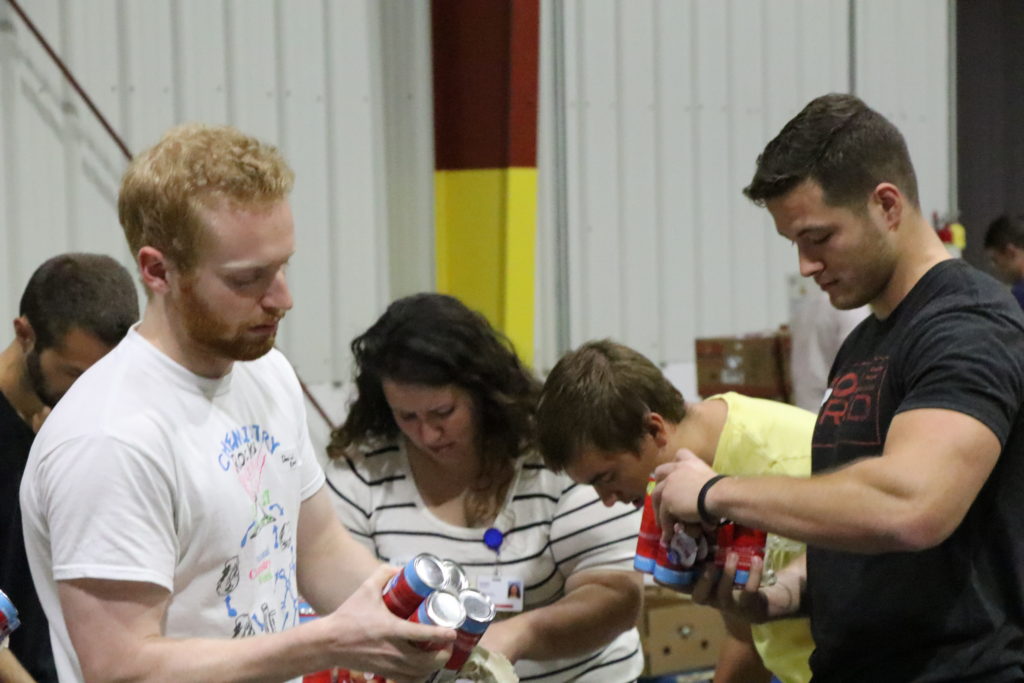How do 26 medical students connect with our food bank? This is the 3rd year we have engaged the class of 1st year medical students enrolled in the I.U. School of Medicine, I.U. Ball Memorial Campus. Derron Bishop, PhD, Associate Dean and Director along with Michael Litt, PhD, Associate Professor Medical Genetics have reached out to us to engage these students as part of their Service Learning Transitions 1 focusing on Health Care Disparities. August 10th, Dorica Watson, our Community Engagement Manager and I spent 2 hours in their class room to share with them some insights with poverty, food insecurity, prospective and relationships between wealth, middle income and poverty populations. We discussed our relationship with Feeding America, the national network with a reach of regional food bank touching every county in the U.S. As we moved through the discussion, the idea of what can they do and/or expect to see as doctors was shared as well. The ER is busy with lots of circumstances of people in poverty waiting too long to seek medical attention or running to the ER for every incident that may have been treatable through a family physician if they had the money to see one. We finished our time together in the class room by engaging them in a poverty exercise to see how well they could navigate a month with unpredictable circumstances of life happening while possessing very limited resources. It sorely challenged them.
The group of 26 visited our facility on August 13th for more interaction and a deeper dive into the poverty topic. After a tour, they got hands-on with helping us sort and package food products for distribution through the pantry system and other programs. We also engaged them with a training exercise we offer to the community that asks them to pair with another student and navigate real life circumstances that a “family” in poverty could face. The last formal engagement with the students will provide them time to debrief about their experience through several presentations they will make to our team. Last year’s class spoke about how the information and hands-on experience gave them a better appreciation for the work we do, but also the life circumstances of a population that many of them will encounter professionally the rest of their working career.
As school is staring again, our rollout of new School Food Pantry Program continues. Between now and the end of 2018, we will have 5 more schools engaged in this relationship building program. This will take our total up to 28 schools in 7 counties. The acceptance of this program has been very strong. Teachers are meeting and greeting the families they are now seeing on a regular basis. Schools who previously had parental interaction with parents in the single digits are now seeing hundreds of people on a regular basis. One school has been able to re-organize a parent- teacher organization with parents leading the way. Another school principal emailed me and said this program is the most positive thing he had experienced in 13 years as an administrator.
Community partners, both funders and volunteer groups, so far have signed on again or expanded their commitment for another year or have agreed to a multi-year commitment. The future development and expansion of this program is mapped out in a multi-year schedule with flexibility for new partnerships as they form. We will continue to engage communities in all 8 counties to consider investing in relationship building for the families and schools to positively impact the children as they move toward a sustainable future. Because we live here, we can address our community solutions by focusing on local relationships. It doesn’t require a bureaucratic national program. It requires local people to engage with other local people. This can be done whether you’re a doctor or a student.
Tim Kean is the President and CEO of Second Harvest Food Bank of East Central Indiana. The Second Harvest Food Bank network of 115-member agencies, programs and 23 schools provide food assistance and self-sustainability skills to more than 67,000 low-income people facing hunger in Blackford, Delaware, Grant, Henry, Jay, Madison, Randolph and Wabash Counties.


